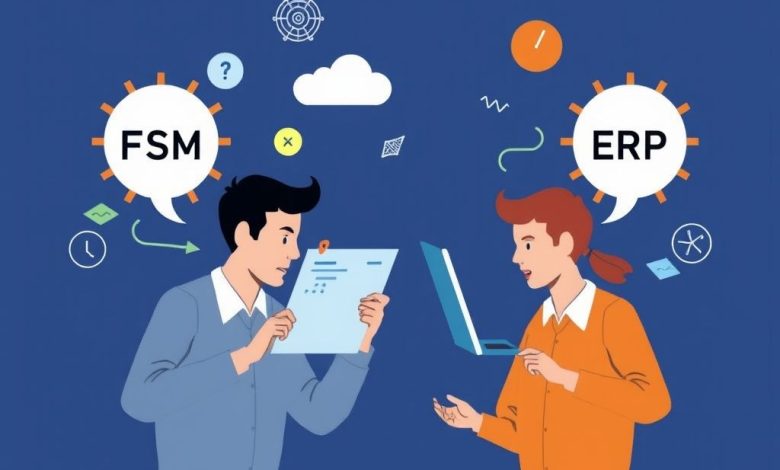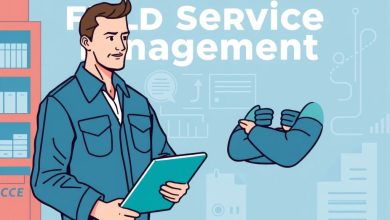FSM vs CRM vs ERP Key Differences

FSM vs CRM vs ERP: Key Differences
Introduction
Field Service Management (FSM), Customer Relationship Management (CRM), and Enterprise Resource Planning (ERP) systems are three distinct types of software solutions used in various industries. While they share some commonalities, each system serves a unique purpose and offers specific benefits. This article aims to explore the key differences between FSM, CRM, and ERP, providing insights for field service managers who need to choose the right software for their business needs.
What is Field Service Management (FSM)?
Field Service Management software is designed specifically for companies that send technicians or service professionals to customers’ locations. FSM systems help manage and optimize field operations, including scheduling, dispatching, and resource allocation. Some key features of FSM include:
- Real-time job scheduling and dispatching
- Mobile workforce management
- Inventory tracking and management
- Customer relationship management within the field service context
- Reporting and analytics for performance optimization
What is Customer Relationship Management (CRM)?
Customer Relationship Management software is used to manage all aspects of customer interactions and relationships. CRM systems help businesses build and maintain strong, lasting relationships with their customers. Key features of CRM include:
- Contact and account management
- Sales force automation
- Marketing automation
- Customer support and service management
- Analytics and reporting on customer behavior and preferences
What is Enterprise Resource Planning (ERP)?
Enterprise Resource Planning software integrates various business functions into one system, providing a comprehensive view of the organization. ERP systems typically include modules for financials, human resources, supply chain management, and manufacturing. Key features of ERP include:
- Financial management and accounting
- Human capital management
- Supply chain management
- Manufacturing execution systems
- Business intelligence and reporting
Key Differences between FSM, CRM, and ERP
While FSM, CRM, and ERP share some commonalities, there are significant differences in their focus areas and functionalities:
- Scope of Operations:
- FSM focuses primarily on managing field-based services and operations
- CRM concentrates on customer interactions and relationships
- ERP provides a broad overview of enterprise-wide operations
2. Target Users:
- FSM is primarily used by field service managers and technicians
- CRM is utilized by sales teams, marketing departments, and customer support agents
- ERP is employed across various departments and levels of an organization
3. Data Collection and Analysis:
- FSM collects data related to field operations and service delivery
- CRM gathers information about customer interactions and preferences
- ERP aggregates data from multiple business functions to provide a holistic view
4. Integration Capabilities:
- FSM often integrates with other field service tools like GPS navigation and inventory management systems
- CRM can integrate with email marketing platforms and social media tools
- ERP typically integrates with specialized industry-specific solutions
5. Customization Options:
- FSM offers customization options specific to field service operations
- CRM allows for tailoring to meet individual business needs
- ERP provides extensive customization possibilities due to its wide range of modules
Choosing Between FSM, CRM, and ERP
When deciding which system to implement, consider the following factors:
- Nature of Your Business:
- If you're a service-oriented company with a mobile workforce, FSM might be the best choice
- For businesses focused on customer relationships, CRM could be more suitable
- Organizations seeking integrated management of various business functions should opt for ERP
2. Size and Complexity of Your Organization:
- Small businesses may find FSM or CRM sufficient for their needs
- Medium-sized enterprises might benefit from a combination of FSM and CRM
- Large corporations often require the comprehensive approach offered by ERP
3. Budget Constraints:
- FSM and CRM tend to be less expensive than ERP implementations
- Consider the long-term benefits and potential cost savings when evaluating investments
4. Technology Infrastructure:
- Ensure your IT infrastructure can support the chosen system
- Consider cloud-based solutions for easier implementation and scalability
5. Training Requirements:
- Evaluate the learning curve for each system and plan accordingly
- Consider the availability of training resources and support
Conclusion
Understanding the key differences between FSM, CRM, and ERP is crucial for field service managers who need to make informed decisions about their business operations. While these systems have distinct purposes, they can complement each other in many cases. By carefully considering your business needs, size, budget, and technology infrastructure, you can choose the right system or combination of systems to enhance your operational efficiency and customer satisfaction.
Remember that implementing any of these systems requires careful planning, proper training, and ongoing support. As field service managers continue to navigate the ever-changing landscape of business operations, staying informed about the latest developments in FSM, CRM, and ERP will ensure they remain competitive in their respective industries.




